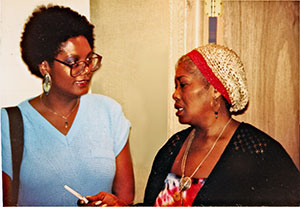Odetta: A powerful voice of the civil rights movement
By
Monica Moorehead
and
Dolores Cox
Published Dec 11, 2008 8:05 PM
"Sometimes I feel like a motherless chile … a long ways from
home"
—Taken from a "Negro" spiritual
|
Monica Moorehead and Odetta backstage
at 1987 benefit concert,
Montgomery, Ala.
|
This spiritual expresses the horrific impact of U.S. slavery on millions
of African people stolen from their homeland. The legendary African-American
folk singer, Odetta, sang this spiritual and others like it with immeasurable
feelings of deep sorrow and anguish.
Bestowed the honorific “Queen of America’s Folk Music” by Dr.
Martin Luther King Jr., Odetta’s voice was silenced on Dec. 2 with her
passing from heart failure in a Harlem, N.Y., hospital. She was 77 years old.
When Rosa Parks, known as “the mother of the civil rights
movement,” was asked which songs inspired her, her reply was the ones
that Odetta sang.
Odetta Holmes was born Dec. 31, 1930, in Birmingham, Ala., during the Great
Depression. At the age of six her family moved to Los Angeles. She started
playing the acoustic guitar at the age of 19. In the 1950s she performed in the
musical “Finian’s Rainbow” and sang in coffee houses before
permanently moving to New York. Her first solo album, “Odetta Sings
Ballads and Blues,” was released in 1956. She would eventually perform at
New York’s Carnegie Hall.
For Odetta, folk music—be it spirituals, blues or work songs—was a
vehicle for expressing the plight and experiences of racism and injustice
experienced by Black people dating back to the days of slavery.
Odetta was instrumental in bringing work songs to a broader audience. These
were songs originally sung by Black prisoners on chain gangs to express their
enslaved-like conditions in the South—picking cotton in the fields or
breaking up rocks with sledgehammers under the gun and whip, from sunup to
sundown.
In reference to work songs, Odetta stated, “They were liberation songs.
You’re walking down life’s road, society’s foot is on your
throat, every which way you turn you can’t get from under that foot. And
you reach a fork in the road and you can either lie down and die or insist upon
your life.” (New York Times, Dec. 3) Odetta also sang songs about working
women, including mothers comforting crying babies while rocking them to
sleep.
Odetta used her talents to push forward the struggle for social justice on many
fronts.
The 1963 March on Washington, which brought out 250,000 people to demand jobs
and full equality for all, is best known for Dr. King’s “I Have a
Dream” rally speech. Odetta sang three songs at that rally.
She marched alongside Dr. King in the Selma-to-Montgomery march in 1965. She
did fundraising concerts for important mobilizations. She performed at the
NYC's Village Gate to help raise funds for the 100,000-strong, anti-war,
May 3, 1981, March on the Pentagon.
WW managing editor, Monica Moorehead, commented, “Odetta performed two
benefit concerts in 1987 and 1993 to support Snow Hill Institute for the
Performing Arts in Alabama. This institute was founded by my great-grandfather,
William James Edwards, in 1893 to teach former slaves how to read, write and
learn a trade. With very little resources, the school was reopened by my
mother, Consuela Lee, to teach indigent, Black rural children their rich
heritage of jazz, spirituals and folk music. The fact that Odetta would take
time out of her busy schedule to showcase her incredible talents in support of
a small, isolated school in the poor county of Wilcox was so awe inspiring and
an experience that all who were present will never forget. She is someone who
all cultural artists should aspire to be.”
Moorehead’s uncle, acoustic bassist and composer, Bill Lee aka William
James Edwards Lee III, told WW, “I became a folk-jazz bassist while I
lived in Chicago at the Gate of Horn club, just north of downtown Chicago.
Another bassist asked me to sub for him while I was working with Josh White. I
became the house bass player.
“Odetta followed Josh White as the next attraction and we ‘hit it
off.’ She asked me to become her bass player and we immediately became a
duo in the late 1950s. I found her to be musical and understanding in her
approach to life. We traveled all over the world together, including Africa.
Our concerts were successful and people everywhere loved Odetta’s
music.”
In 1999, Odetta was awarded the National Endowment for the Arts’ National
Medal of Arts. And in 2003, the U.S. Library of Congress presented Odetta with
the ‘Living Legend Award.’
Odetta was hoping to sing at Barack Obama’s upcoming Jan. 20 presidential
inauguration, and had a poster of him over her hospital bed when she died. Even
with her physical death, recordings of Odetta’s music will continue to
have the power to heal, to soothe frustration and inspire Black people.
The lyrics to the spiritual, “Oh, Freedom!” that Odetta performed
at the 1963 March on Washington succinctly epitomizes her life: "Oh freedom, Oh freedom, Oh freedom over me/ An befo' I'd be a
slave, I'll be buried in my grave/ An' go home to my Lord an' be
free."
Articles copyright 1995-2012 Workers World.
Verbatim copying and distribution of this entire article is permitted in any medium without royalty provided this notice is preserved.
Workers World, 55 W. 17 St., NY, NY 10011
Email:
[email protected]
Subscribe
[email protected]
Support independent news
DONATE


